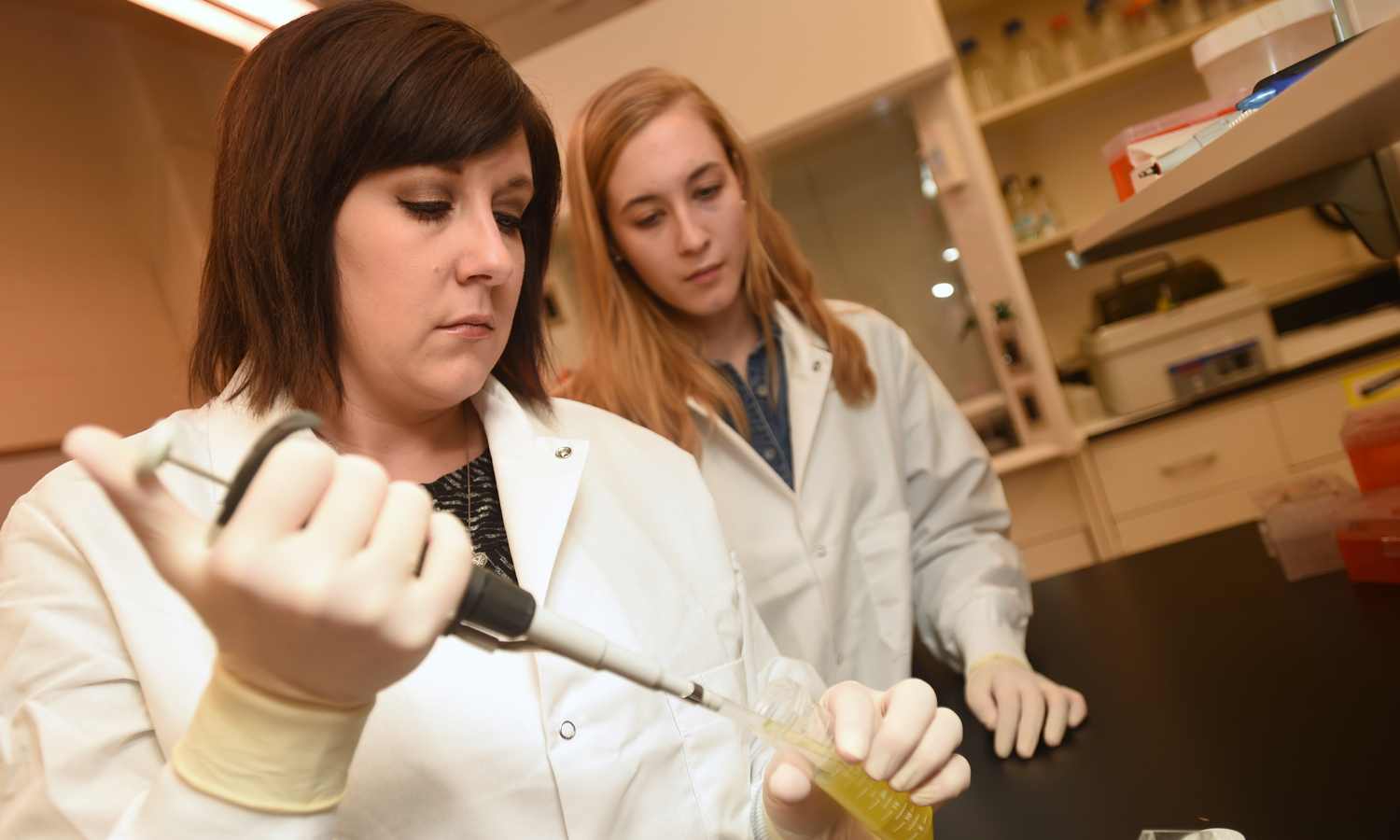Developmental Research Project Program
Overview of the DRPP
The New Mexico IDeA Network of Biomedical Research Excellence (NM-INBRE) Developmental Research Project Program (DRPP) is driven by the overarching goals of the IDeA program, aiming to enhance biomedical and biobehavioral research capacity while elevating the competitiveness of investigators for participation in NIH research funding and training programs. Guided by a visionary approach, the NM-INBRE DRPP actively engages institutions of higher education in New Mexico, fostering a collaborative, multidisciplinary research network with a strategic focus on addressing significant biomedical questions and critical health problems pertinent to the diverse population of our local communities and the nation at large. The program’s success lies in its ability to stimulate research across partner institutions, encourage collaborations, and instigate transformative changes in departmental and institutional cultures, ultimately strengthening research capabilities and broadening opportunities for impactful contributions to the scientific community.

Structure of the NM-INBRE-5 DRPP
In the 5th cycle of NM-INBRE DRPP, significant changes have been made, influenced by the evaluation of outcomes from the 4th cycle and new instructions in PAR-23-100. The revised DRPP award types will comprise Research Projects (RP) and two kinds of Pilot Projects (PPN and PPE), with a focus on enhancing the research environment of institutions and offering hands-on research experiences to undergraduate students. Additionally, projects assigned to non-PUI investigators are encouraged to provide support for postdoctoral fellows.
Research Projects (RP)
The Research Projects (RP) aim to support promising faculty conducting studies that explore innovative scientific ideas, new model systems, or the development of impactful tools and technologies in various biomedical research areas. Leaders of these projects (RPLs) must be eligible for NIH “R-type” grants, committing a minimum of 50 percent of their professional effort to the project. The funding ranges from $50,000 to $125,000 per year (depending on project scope) for a up to two years, with the possibility of renewal.
Pilot Projects (PPN and PPE)
The Pilot Projects (PP) program comprises two mechanisms, PPN and PPE, supporting small-scale research projects. PPN is for new investigators, focusing on summer research and potential NIH funding development. PPE is for established investigators, promoting new ideas, preliminary data collection, and specialized training. Project leaders must be eligible for NIH “R-type” grants, dedicating at least 25% of their professional effort, with funding levels ranging from $10,000 to $50,000 for one year. While PPNs are renewable, PPEs are not renewable.
NIRF Fellows Program
New Mexico INBRE Research Faculty
The NM-INBRE Research Faculty (NIRF) program is a professional development and training program to support faculty in developing biomedical research programs and is designed to provide developmental training for faculty new to grant writing, research lab management, and/or are in the first two years of their first tenure-track faculty position, but will be open to any interested faculty at all NM-INBRE network institutions, and is required for DRPP Investigators funded by the Research Project (RP) or Pilot Project for New Investigators (PPN) mechanisms. This training is provided through NIRF virtual workshops offered every other month during the calendar year beginning in April 2024. Tentative 2024 dates are April 12, June 14, August 9, October 11, December 13.
Examples of NIRF Program Workshop Topics
Managing Academic Life
- Creating work-life balance
- Time management
- Balancing professional effort
- Effective communication
- Dealing with adminstrators
- Stress management
- Identifying success barriers
- Identifying balance
- Countering sexism/racism
- Mentoring
- Managing dificult people
- Service in academia
- Outreach in academia
Perfecting Your Craft
- Manuscript writing
- Minimal publishable units
- Effective lab management
- Research ethics
- Preparing budgets
- Grant application elements
- Dissecting funding announcements
- Federal grant review process
- Interpreting reviews
- Professional networking
- Research presentations
- Writing with students
We are no longer accepting applications for the 2024 NIRF Fellows program
Spring 2024 NIRF Perfecting Your Craft Workshops
NIRF workshops run every 2nd Friday of the month, open to any interested faculty at all NM-INBRE network institutions. All are virtual, All run from 2-5pm, with 4-5pm set aside for Q&A on any grant-related subject.
Elements of the NIH grant application, Specific Aims, Biosketch, Facilities and Other Resources
This online seminar, is scheduled for April 12th, 2024.
Attendance will require registration.
Regisration is now Closed
Preparing the NIH Budget, Significance/Innovation sections, Mentors/Collaborators, PEDP requirement
This online seminar, is scheduled for May 10th, 2024.
Attendance will require registration.
Approach section, Rigor and Reproducibility, Data Management & Sharing, Letters of Support
This online seminar, is scheduled for June 14th, 2024.
Attendance will require registration.
Submission Review and Selection of Projects for the DRPP
1. An optional request for pre-submission support through the NIRF program as a NIRF fellow.
2. Open submission, review, and approval of a statement of intent.
3. Submission of invited applications.
4. Review of applications.
5. EAC approval of selected applications.
6. NIH notification/approval of selected projects.

| Date | Action | Description |
|---|---|---|
| Early to mid Feb. | Applications for NIRF program due date | PUI Faculty needing research development and training apply for the NIRF program.PUI faculty may request one month summer salary. |
| Late Feb. - early Mar. | Notification of NIRF program acceptance | Five PUI Faculty are selected for NIRF program per year. |
| Early Mar.- July | NIRF grant-related professional development | NIRF participants obtain research development training and individualized grantsmanship training sessions with DRPP director and/or Science Advisors. Grant writing workshops will be open to any faculty at partner institutions. |
| Early July | DRPP pre-applications due | Pre-applications are accepted from any partner institution faculty and screened for adherence to NM-INBRE goals. |
| Mid July | DRPP pre-applicants invited to apply | Pre-application content used to identify external reviewers for DRPP application. |
| ~Early Aug. | NM-INBRE annual symposium | DRPP applicants attend current RP and PP presentations and professional development activities designed for DRPP applicants. |
| Mid Aug. | DRPP applications due | RP and PP applications are accepted from invited faculty |
| Early Sep. | Application reviews complete | Applications are reviewed and scored using NIH and NM-INBRE criteria. Reviews are used by EC and AC to make funding recommendations. |
| Mid Sep. | EAC Receives request for approval | EAC considers application material and external reviews and approves or declines. |
| Early Oct. | NIH is notified, sub awards prepared | Projects with IRB or IACUC sent to NIH grants management for approval; project with no assurances required are sent for notification. The AC starts preparing sub-awards for projects |
| Early Nov. | DRPP projects start |
Collaborative Proposals
NM-INBRE seeks to foster collaborations that develop cross-institutional research relationships within the Network. Proposals that link formally to another proposal or existing project within the NM-INBRE network are especially encouraged. Proposals from research-intensive institutions involving formal collaboration with proposals from an NM-INBRE PUI will be prioritized.
Collaborative research must have one investigator from an NM-INBRE Institution and can include collaborating investigators from the following:
- NM-INBRE network PUI institutions
- NM-INBRE network Non-PUI institutions
- Institutions of the Regional Alliance of INBRE Networks (RAIN): AK, HI, ID, MT, NV, NM, and WY
Other DRPP Expectations
- Foster student participation and employ good mentorship and training practices
- Contribute to NM-INBRE network activities
- Publish in peer-reviewed journals and acknowledge INBRE funding and resources
- Present at scientific meetings
- Seek and utilize shared core facilities and resources
- Manage budgets (spend $$ each year)
- Comply with policies: federal, agency, institutional
- Make and meet professional development goals
- Attend Annual INBRE Symposium
We are currently not accepting applications for research projects. However, we will post updates here once applications do open up again.
